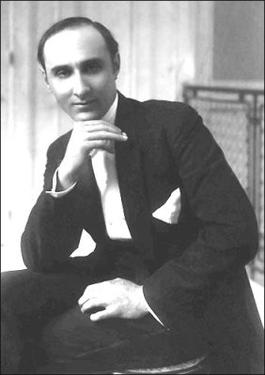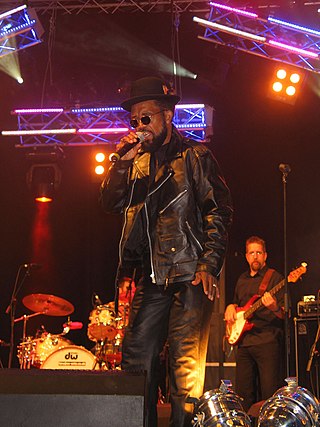Related Research Articles
Ska is a music genre that originated in Jamaica in the late 1950s and was the precursor to rocksteady and reggae. It combined elements of Caribbean mento and calypso with American jazz and rhythm and blues. Ska is characterized by a walking bass line accented with rhythms on the off beat. It was developed in Jamaica in the 1960s when Stranger Cole, Prince Buster, Clement "Coxsone" Dodd, and Duke Reid formed sound systems to play American rhythm and blues and then began recording their own songs. In the early 1960s, ska was the dominant music genre of Jamaica and was popular with British mods and with many skinheads.
The Guns of Navarone or Navarone may refer to:

Dimitri Zinovievich Tiomkin was a Russian-born American film composer and conductor. Classically trained in St. Petersburg, Russia, before the Bolshevik Revolution, he moved to Berlin and then New York City after the Russian Revolution. In 1929, after the stock market crash, he moved to Hollywood, where he became best known for his scores for Western films, including Duel in the Sun, Red River, High Noon, The Big Sky, Gunfight at the O.K. Corral, and Last Train from Gun Hill.

Cecil Bustamente Campbell, known professionally as Prince Buster, was a Jamaican singer-songwriter and producer. The records he released in the 1960s influenced and shaped the course of Jamaican contemporary music and created a legacy of work that would be drawn upon later by reggae and ska artists.
Studio One is one of Jamaica's most renowned record labels and recording studios; it has been described as the Motown of Jamaica. The record label was involved with most of the major music movements in Jamaica during the 1960s and 1970s, including ska, rocksteady, reggae, dub and dancehall.

Ned Washington was an American lyricist born in Scranton, Pennsylvania.
Leslie Kong was an influential Chinese-Jamaican reggae producer.
Since its inception in 1962, the James Bond film series from Eon Productions has featured many musical compositions, many of which are now considered classic pieces of British film music. The best known piece is the "James Bond Theme" composed by Monty Norman. Other instrumentals, such as "On Her Majesty's Secret Service", and various songs performed by British or American artists such as Shirley Bassey's "Goldfinger", Nancy Sinatra's "You Only Live Twice", Paul McCartney's "Live and Let Die", Carly Simon's "Nobody Does It Better", Sheena Easton's "For Your Eyes Only", Duran Duran's "A View to a Kill", Tina Turner's "GoldenEye" also become identified with the series.

The "James Bond Theme" is the main signature theme music of the James Bond films and has featured in every Eon Productions Bond film since Dr. No, released in 1962. Composed in e minor by Monty Norman, the piece has been used as an accompanying fanfare to the gun barrel sequence in every Eon Bond film besides the 2006 reboot Casino Royale.
"The High and the Mighty" is a song by Ned Washington and Dimitri Tiomkin from the film of the same name.
"Theme from A Summer Place" is a song with lyrics by Mack Discant and music by Max Steiner, written for the 1959 film A Summer Place, which starred Sandra Dee and Troy Donahue. It was recorded for the film as an instrumental by Hugo Winterhalter. Originally known as the "Molly and Johnny Theme", this lush extended cue, as orchestrated by Murray Cutter, is not the main title theme of the film, but an oft-heard secondary love theme for the characters played by Dee and Donahue.
"Why" is a hit song recorded by Frankie Avalon in 1959. It reached No. 1 on the U.S. Billboard Hot 100 chart published on the week of December 28, 1959. It was Avalon's second and final No. 1 hit.

The Guns of Navarone is a 1961 adventure war film directed by J. Lee Thompson from a screenplay by Carl Foreman, based on Alistair MacLean's 1957 novel of the same name. Foreman also produced the film. The film stars Gregory Peck, David Niven and Anthony Quinn, along with Stanley Baker, Anthony Quayle, Irene Papas, Gia Scala, James Darren and Richard Harris. The book and the film share a plot: the efforts of an Allied commando unit to destroy a seemingly impregnable German fortress that threatens Allied naval ships in the Aegean Sea.
"Lara's Theme" is the name given to a leitmotif written for the film Doctor Zhivago (1965) by composer Maurice Jarre. Soon afterward, the leitmotif became the basis of the song "Somewhere, My Love". Numerous versions, both orchestral and vocal, have been recorded, among the most popular was the version by Ray Conniff Singers.
The 19th Golden Globe Awards, honoring the best in film and television for 1961, were held on March 5, 1962.

Locomondo is one of the most known and successful bands in Greece.
The Skatalites are a ska band from Jamaica. They played initially between 1963 and 1965, and recorded many of their best known songs in the period, including "Guns of Navarone." They also played on records by Prince Buster and backed many other Jamaican artists who recorded during that period, including Bob Marley & The Wailers, on their first single "Simmer Down." They reformed in 1983 and have played together ever since.

Exodus is a soundtrack album by Ernest Gold with the Sinfonia of London from the 1960 film Exodus directed by Otto Preminger.

Les Compagnons de la chanson were a French harmony vocal group, formed in 1946 from an earlier group founded in Lyon, France in 1941. Their best known song was "Les trois cloches" recorded with Edith Piaf in 1946. They were eight or nine members in the group, and they were popular in France with some success internationally, and they continued to perform until 1985.
"The Green Leaves of Summer" is a song by Paul Francis Webster, with music by Dimitri Tiomkin, written for the 1960 film The Alamo. It was performed in the film's score by the vocal group The Brothers Four. In 1961, the song was nominated for an Academy Award; its parent soundtrack, for the film The Alamo, was awarded a Golden Globe Award for Best Original Score.
References
- ↑ "Dimitri Tiomkin". www.mtv.com. Retrieved 22 April 2014.
- ↑ "Guns of Navarone". www.shapirobernstein. Retrieved 22 April 2014.
- 1 2 "Skatalites". The Official Charts Company.
- ↑ Hughes, Howard (2012). When Eagles Dared: The Filmgoers' History of World War II. Bloomsbury Publishing. p. 73. ISBN 9780857721501.
- ↑ "Late Pop Spotlights". Billboard. July 10, 1961. p. 3.
- ↑ Catalog of Copyright Entries: Third series. Library of Congress. Copyright Office. 1962.
- ↑ "The 19th Annual Golden Globe Awards (1962)". Golden Globes. Archived from the original on March 8, 2012.
- ↑ "Billboard Hot 100". Billboard. August 12, 1061. p. 34.
- ↑ "Hits of the World: France". Billboard. December 4, 1961.
- ↑ "Les Compagnons De La Chanson – Navarone". Ultratop.
- ↑ "Guns of Navarone". AllMusic. Retrieved 22 April 2014.
- ↑ "The Skatalites". Itunes. Retrieved 22 April 2014.